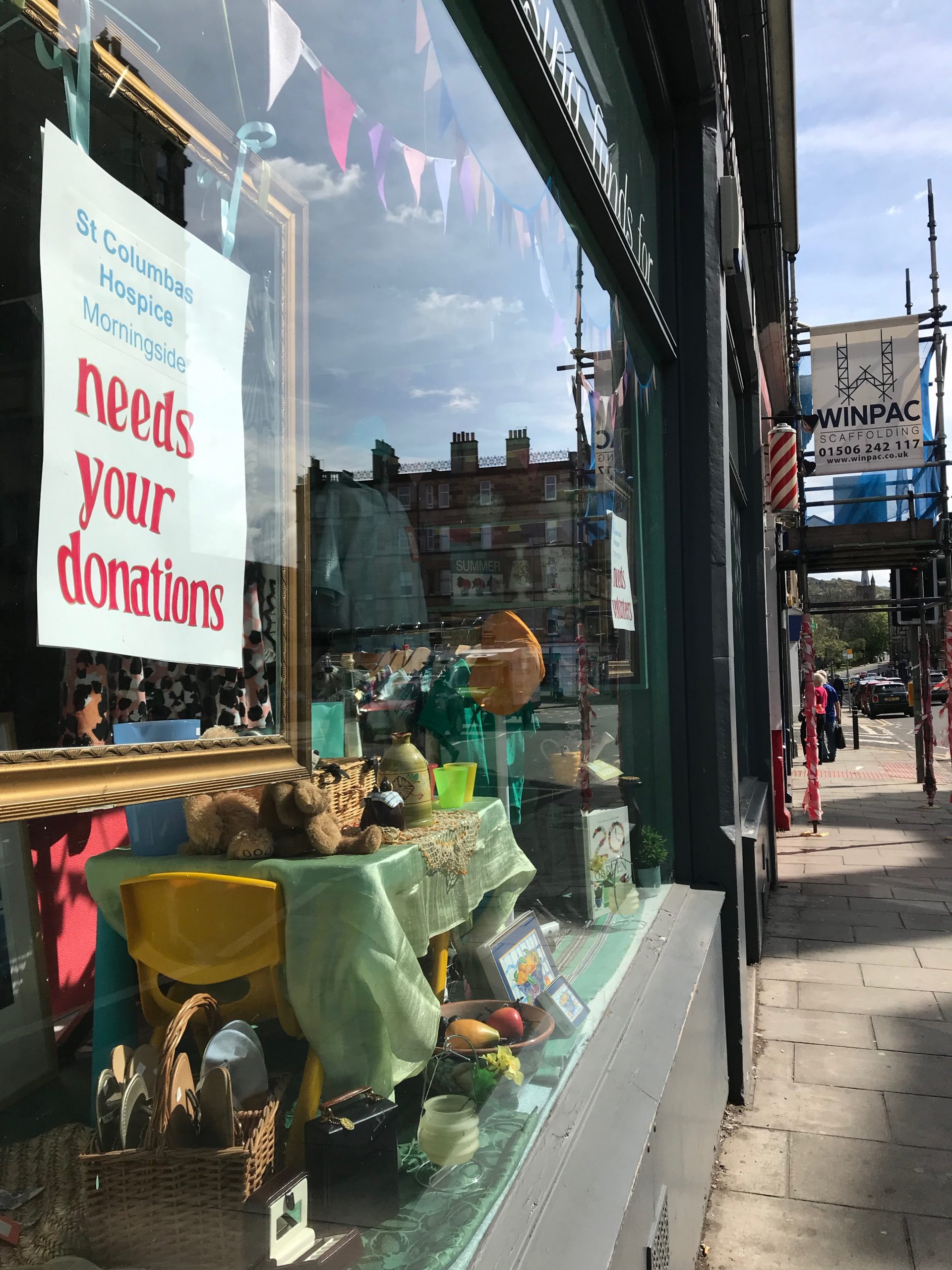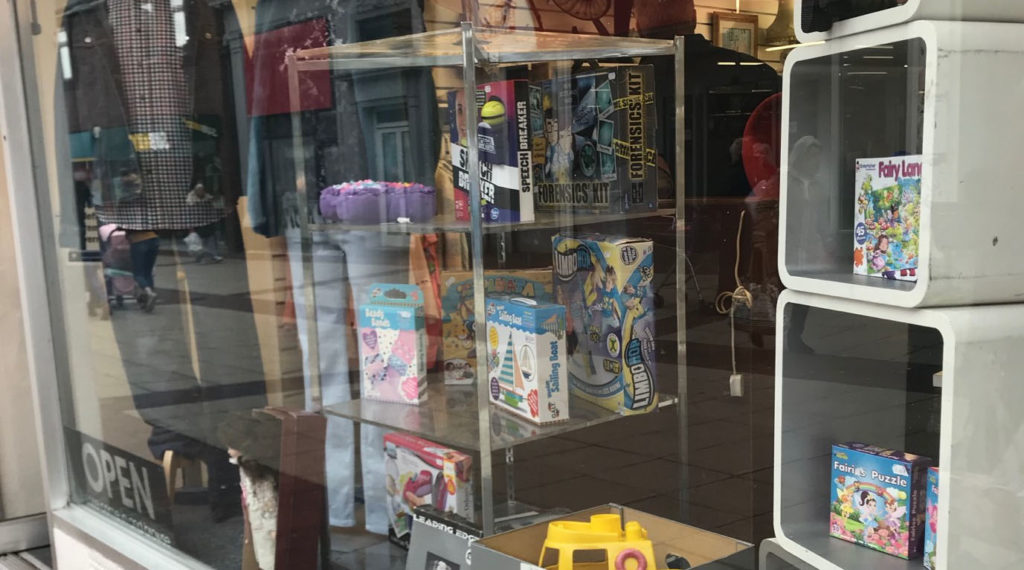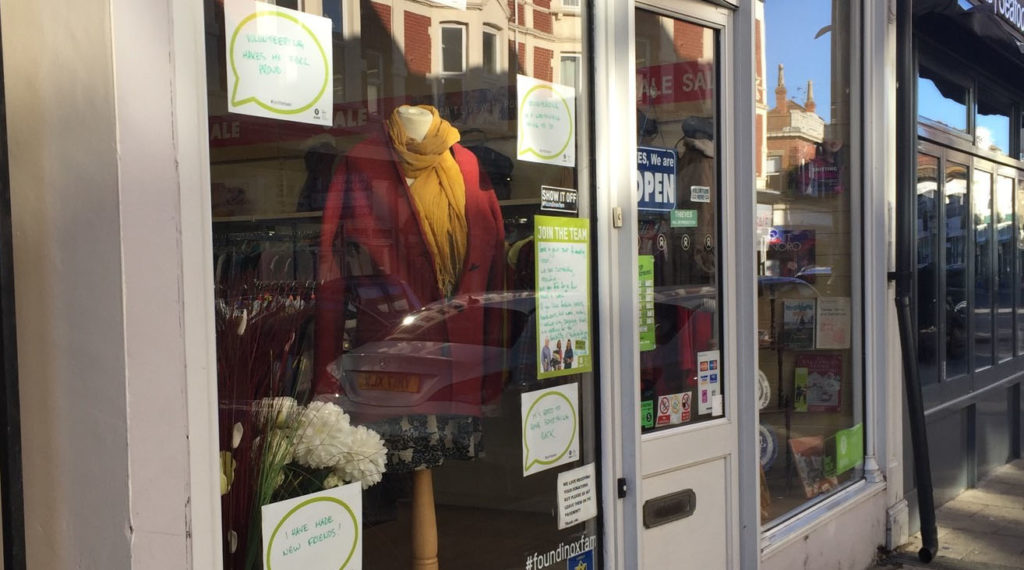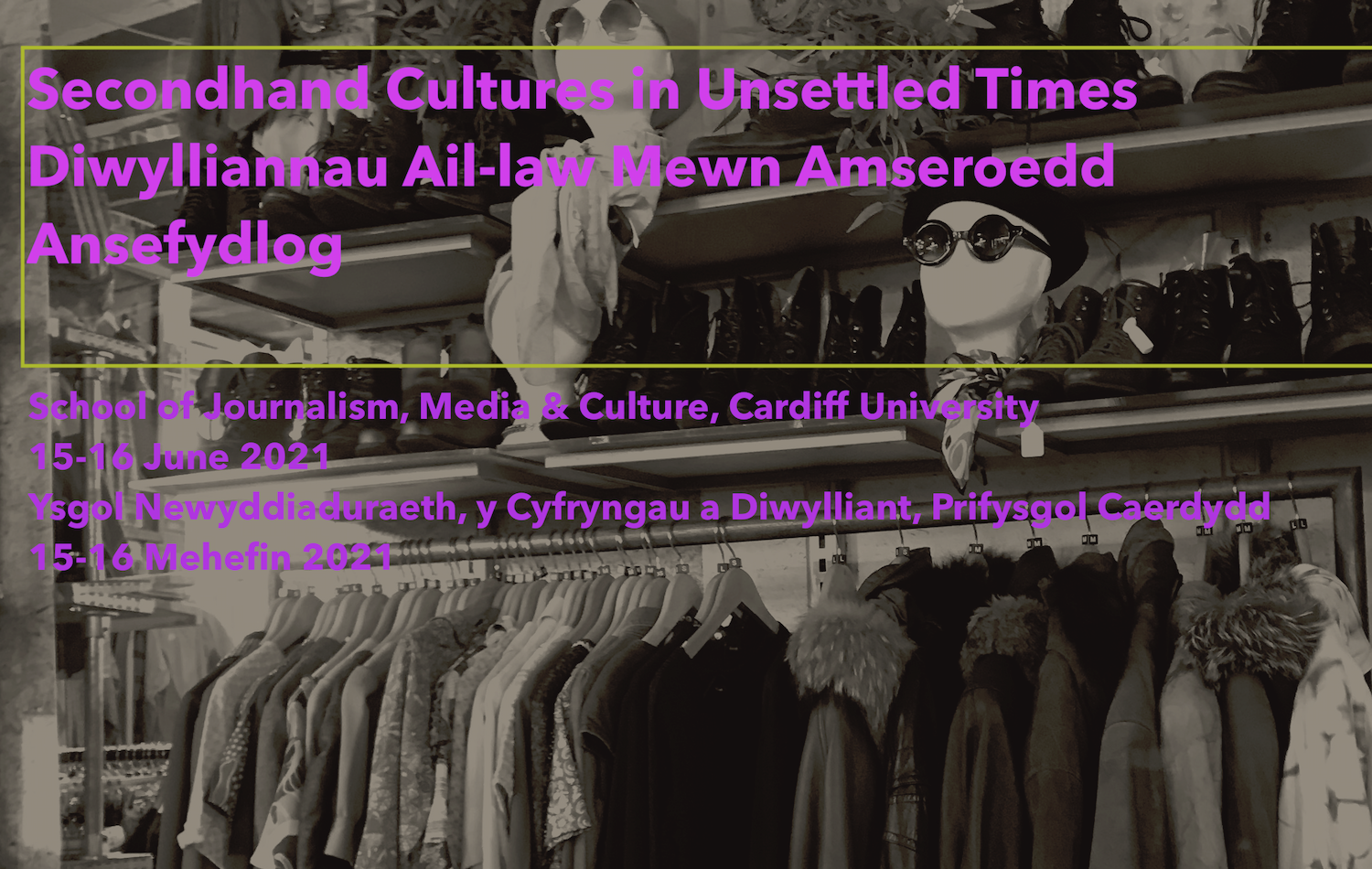The Secondhand Cultures in Unsettled Times Symposium, held online 15-16 June 2021, brought researchers and practitioners from around the world together to talk about pressing issues related to secondhand cultures and economies.
Many thanks to all of the brilliant presenters. The symposium was co-organised by Dr Jennifer Ayres (NYU), Dr Triona Fitton (University of Kent), and Dr Alida Payson (Cardiff University), with the help of research assistant and JOMEC BA grad Kamila Buczek. It was supported by The Leverhulme Trust and Cardiff University’s School of Journalism, Media & Culture (JOMEC).
If you missed the 2021 symposium, see the short programme below!
The symposium has led to some exciting new connections and a growing Secondhand Research Network. We have some research network activities coming up in 2022:
- a special issue of JOMEC Journal – CFP closes 10 January 2022
- a series of four online workshops problem-solving challenges in secondhand, funded by the ESRC impact accelerator awards at Cardiff University
- a second online/hybrid Secondhand Cultures conference for June/July 2022
Follow @2ndhandcultures on Instagram and Twitter to get involved and keep in touch.
Secondhand Cultures in Unsettled Times
Day 1 – 15 June 2021
Welcome and Introduction to the symposium with co-organisers Dr Jen Ayres, Dr Triona Fitton (University of Kent), Dr Alida Payson (Cardiff University) and Kamila Buczek (Cardiff University)
Introductory Workshop: Well-Worn: Falling Back in Love With Our Clothes
Wendy Ward (Independent practitioner /author)
◊ Show and tell and reflection session. Participants can bring (or wear!) to the workshop an item of well-worn and/or well-used clothing.
1.1 FABSCRAP Textile Journeys
- ◊ Dhamar Romo Chavez (FABSCRAP Community Coordinator) Textile journeys: One-stop textile reuse and recycling enterprise providing fabric scrap pick-ups, sorting, consolidation, and recycling in New York City
1.2 Panel – The meanings of second-hand buying and selling in modern England
Chair: Dr Henry Irving (Leeds Beckett University)
- ◊ Dr Natalie L. Mann (University of Warwick) “Scavver”, “Tatter”, or “Saviour”?: The unsettling figure of the scrap metal collector
- ◊ Dr George Campbell Gosling (University of Wolverhampton), Fundraising and Thrift: The multiple meanings of second-hand charity retail
- ◊ Dr Cheryl Roberts (Royal College of Art), Negotiating Fashionability: Second-hand dealing, jumble sales and street markets trading in 1930s East End London
1.3 Global fashion cultures
Chair: Professor Hazel Clark (Parsons, The New School)
- ◊ Dr Aulia Rahmawati, Syafrida N. Febriyanti and Ririn P. Tutiasri (University of Pembangunan Nasional ‘Veteran’, Indonesia), “Thrifting is Thriving”: Secondhand Fashion Consumption and the Indonesian Youth
- ◊ Liz Ricketts (The OR Foundation), The OR Foundation: No sustainability revolution without justice in supply chains
- ◊ Brigitte Stockton (Bucks New University), Second-hand clothing and young adults in Dalian, Northern China
1.4 Design Education 1
Chair: Dr Sara Tatyana Bernstein
- ◊ Dr Sara Tatyana Bernstein and Dr Elise M. Chatelain (Dismantle Magazine) Dismantle Magazine: Fashion, Popular Culture, Social Change
- ◊ Dr Elaine Igoe, Susan Noble , Lara Torres and Jennifer Cunningham
(University of Portsmouth) Commoning situated knowledge; Co-teaching-and-learning the ‘design-led upcycling’ of waste clothing - ◊ Claire Wellesley-Smith (The Open University) Conversations through reuse and remaking in a contemporary ‘Economy Quilt’
5. Household economies
Chair: Dr David Nettleingham (University of Kent)
- ◊ Professor Jon Stobart (Manchester Metropolitan University) and Dr Sara Pennell (University of Greenwich) The anxieties of the auction: risk and the trade in second-hand household goods in eighteenth-century England
- ◊ Lorna Flutter (Cardiff University) Handing down home among boatdwellers
- ◊ Dr Jennifer Le Zotte (UNC Wilmington) Secondhand Studies as Historical Gap-Work
6. Charity shop & thrift store ethnographies
Chair: Dr Jennifer Ayres (NYU)
- ◊ Violet Broadhead (University of Bristol), Salvage and waste in charity shop stockrooms
- ◊ Siobhan Kelly (University of Salford), Sociability and belonging or professionalism and profit? Exploring the lived experience of volunteers aged 65+ working within the charity retail sector
- ◊ Dr Jennifer Ayres (NYU), The Work of Shopping
7. Objects and exchange
Chair: Dr Triona Fitton (University of Kent)
- ◊ Maya Wassell Smith (Cardiff University), Sold at the Mast: Secondhand cultures and social economies at sea in the Nineteenth Century
- ◊ Vita Kurland (New York University), eBay: The Secondhand Market and USPS Memorabilia
- ◊ Dr Triona Fitton (University of Kent), Gifts in the “Quiet Economy”: an ethnography of UK charity shops
8. Problematizing Second Hand Cultures
Chair: Dr Alida Payson (Cardiff University)
- ◊ Petra Seitz (The Bartlett School of Architecture, UCL); Nia Thandapani (Design historian and designer); Gregor Wittrick (British Museum) Problematizing Second Hand Cultures: Chandigarh’s Modernist Furniture
- ◊ Nicole Rivas (Independent fashion archivist & researcher) Archaeology of Fashion: and the Discourse on Secondhand Objects
Book talk 1 – Tansy Hoskins, Stitched Up: The Anti-capitalist Book of Fashion (Pluto Books, 2014) (with Dr Jennifer Ayres)
Keynote: Professor Avril Maddrell (University of Reading) ‘Unsettled Times & Unsettling Secondhand Cultures’
(discussant, Dr Triona Fitton)
Secondhand Quiz and Social – (created & led by Kamila Buczek and Triona Fitton)
Secondhand Cultures in Unsettled Times Day 2 – 16 June 2021
Welcome to Day 2 – Design sprint – secondhand futures, or what next for secondhand research & praxis?
- Led by CharioCity team: Professor Rebecca Earley, Sanne Visser, and Charlie Dexter (Centre for Circular Design, Chelsea College of Arts, University of the Arts London)
2.0 Research/Practioner Workshops
- 2.1 Dr Amy Twigger Holroyd (Nottingham Trent University) Fashion Fictions Secondhand Safari – a participatory research project to generate, experience and reflect on engaging fictional visions of alternative fashion cultures and systems.
- 2.2 Kat Roberts (Cornell University) Fabric Scrap Twine Workshop: Contemplating Waste-free Creative Practices (BYO fabric and scissors)
- 2.3 Dr Jules Findley (University of Brighton) Secondhand and the Tacit
2.4 Vintage sellers panel
Chair: Dr Jennifer Ayres (NYU)
- ◊ Dr Liz Tregenza (Colchester and Ipswich Museums Service, vintage seller) Top Tat? Selling vintage fashion in the twenty first century
- ◊ A. Cleopatra, Vêtement Vintage
- ◊ Liisa Jokinen, Gem – vintage search app
- ◊ Pilar Garibay, Bodega No. 3
2.5 Waste, households, and the state
Chair: Dr George Campbell-Gosling (University of Wolverhampton)
- ◊ Rhiannon Craft (Cardiff University) The Social (De)Construction of
Waste: Bodging, Tatting and Making Do - ◊ Dr Annebella Pollen (University of Brighton) Post-mortem Dress:
Extinguished Sparks - ◊ Rose Sinclair (Goldsmiths, University of London) The Jumble Sale: Second hand Thrift: From Dorcas Society’s to Dorcas clubs
2.6 Design education 2
Chair: Dr Greg Climer (California College of the Arts)
- ◊ Naomi Dunstan (Cardiff University) Teaching Fashion Futures: Technology, Innovation, and Society
- ◊ Professor Becky Earley (University of the Arts London) CharioCity: design education for the circular economy
- ◊ Helen O’Sullivan (University of Portsmouth) Educating Secondhand Cultures – The pupil perspective (Film) Year 7 pupils share their upcycled creations
- ◊ Hannah Carter, Love Not Landfull campaign, ReLondon
2.7 Makers, remakers & designers
Chair: Kelly L. Reddy-Best (Iowa State University)
- ◊ Professor Mark Joseph O’Connell (Seneca College, Toronto, Canada) Y Sin Embargo Te Quiero (And Yet I Love You) Economic Policy Encoded in the Consumption of Used Garments
- ◊ Dr Gesche Huebner (UCL) Clothes with Stories: An interdisciplinary art-science project
- ◊ Kyra G. Streck and Dr Kelly L. Reddy-Best (Iowa State University) Trans YouTube Content Creators: Informal Economies for the Production, Distribution, and Consumption of Trans-Supportive DIY Undergarments – Research in Progress
- ◊ Debarati Sarkar (Jadavpur University) Embroidering as (re)collecting
2.8 Secondhand narratives
Chair: Dr Alida Payson (Cardiff University)
- ◊ Dr Alida Payson (Cardiff University) Makeover Welfare: Mary, Queen of Charity Shops, reality TV and real secondhand politics
- ◊ Brenda Mondragón and Diana Morales (University College Cork and Benemérita Universidad Autónoma de Puebla) From the ‘tianguis‘ to Instagram: Secondhand Market in Puebla-Tlaxcala, Mexico.
- ◊ Elena Johansen (The New School) Goodwill Industries: Unexpected Catalyst of Fashion
2.9 Institutions & reuse
Chair: Dr Triona Fitton (University of Kent)
- ◊ Dr Lucy Wishart (University of St Andrews) Universities as sites of second-hand exchange: exploring the role of non-commercial organisations in the Circular Economy
- ◊ Ceylan Akbas and Eva Souchet (University of Greenwich) The Un/Archived Textiles project – a hub at the University of Greenwich for swapping clothes, organising repair stations and mending workshops using natural dye.
- ◊ Lindsay Parker (King’s College London) Exploring fashion rental practices through a lens of secondhand cultures
Book talk 2 – Rachel Lifter (NYU Steinhardt) ‘Secondhand surprises and future threads’ from Fashioning Indie: Popular Fashion, Music and Gender (Bloomsbury 2018)
(w/ discussant Dr Alida Payson)
Keynote – Professor Angela McRobbie (Goldsmiths, University of London) ‘Unpicking Fashion as Capitalism’s Current Crisis: the Politics of Second-Hand Washing’
(w/discussant Dr Jennifer Ayres)
Film screening: Unravel (14 mins)
Q&A with Professor Lucy Norris (Weißensee Kunsthochschule Berlin)







